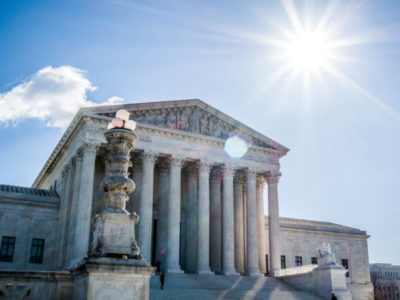It’s perilous to predict a court or jury decision based on the arguments presented.
But supporters of the Affordable Care Act will be heartened by the comments of two Supreme Court justices Tuesday during oral arguments on the bid by several states to overturn the 2010 law.

Georgia is among the 18 states, all led by Republicans, aiming to strike down the ACA, commonly known as Obamacare.
At the center of the case, California v. Texas, is the individual mandate, an original part of the health law. It required most Americans to buy health insurance or pay a tax penalty, but Congress removed the penalty in 2017.
The Republican attorneys general, backed by the Trump administration, argue that if that key mandate is unconstitutional, the whole law must be struck down.
Two members of the court’s conservative majority, though, indicated that they are not inclined to strike down the balance of the law. In legal terms, they said the mandate is “severable” from the rest of the law, the New York Times reported.
“It does seem fairly clear that the proper remedy would be to sever the mandate provision and leave the rest of the law in place,” said Justice Brett Kavanaugh.
And Chief Justice John Roberts pointed out that “Congress left the rest of the law intact when it lowered the penalty to zero.”
Roberts and Kavanaugh are considered the swing votes in California v. Texas, Modern Healthcare reported.
Roberts, who wrote the 2012 Supreme Court decision upholding the act’s constitutionality, suggested again that the justices should not do something that Congress itself has declined to do — repeal the health law, the Washington Post reported.

“I think it’s hard for you to argue that Congress intended the entire act to fall if the mandate were struck down when the same Congress that lowered the penalty to zero did not even try to repeal the rest of the act,” Roberts told Kyle D. Hawkins, the Texas solicitor general leading the effort to throw out the ACA. “I think, frankly, that they wanted the court to do that. But that’s not our job.”
Georgia Attorney General Chris Carr, through a spokeswoman, issued a statement Tuesday that emphasized his support of the legal challenge to the ACA: “Americans deserve a health care law that is constitutional and that delivers better outcomes, more access and affordable choices. We can do both.”
Just the latest challenge
It’s the third time a challenge to the ACA has been taken up by the Supreme Court.
Among other provisions, the law has barred insurers from discriminating against people with pre-existing conditions, has created state insurance exchanges for individuals and families who don’t get government or employer coverage, and has added funding for states to expand Medicaid to cover low-income adults.
Georgia is one of 12 states to have rejected Medicaid expansion, with Republican leaders consistently arguing it would be too expensive.
The Supreme Court has substantially upheld the ACA in both previous cases, though the justices in 2012 did limit the federal government’s ability to pressure states to adopt Medicaid expansion.

Throwing out the entire Affordable Care Act would be a tremendous shock to the U.S. health care system, experts say. That move could eliminate:
** Protections for people with pre-existing conditions
** Subsidies to make individual health insurance more affordable
** Expanded eligibility for Medicaid
** Coverage of young adults up to age 26 under their parents’ insurance policies
** Coverage of preventive care with no patient cost-sharing
** Closing of the so-called doughnut hole under Medicare’s drug benefit
Striking down the law would also appear to void Georgia’s waiver plan for reinsurance and to replace the healthcare.gov enrollment set-up. (Here’s a recent AJC article on the waiver.)
New justices could affect ruling
Since the last major challenge to the ACA, in 2015, three new justices have joined the court, all conservatives appointed by President Trump. One of them, Justice Amy Coney Barrett, has been critical of the earlier rulings, the New York Times noted.
In an interview after the 2015 decision — when the court upheld the way tax subsidy provisions were being administered on the ACA exchanges — Barrett, who was then a law professor, said, “I think the dissent has the better of the legal argument.”
But she added at the time, “That’s not to say the result isn’t preferable. . . . It’s clearly a good result that these millions of Americans won’t lose their tax subsidies.”
The latest challenge to the ACA has moved relatively swiftly through the lower courts.
A federal judge in Texas ruled that the entire law was invalid, but postponed the effects of his ruling until the case could be appealed. In December, the U.S. Court of Appeals for the Fifth Circuit, in New Orleans, agreed that the mandate was unconstitutional but declined to rule on the fate of the rest of the law, asking the lower court to reconsider the question in more detail.

Seeking to defend the ACA, Democratic-led states and the U.S. House of Representatives, which is controlled by Democrats, asked the Supreme Court to intervene, saying a prompt decision was needed to remove the uncertainty caused by the lower courts’ decisions.
Striking down the health law would swell the ranks of the uninsured in the United States by more than 20 million people — a nearly 70 percent increase — according to estimates from the Urban Institute.
The high court is expected to rule in the case by June 2021.
For consumers, the court case does not change the coverage they have today or their 2021 insurance plans, noted Laura Colbert of the consumer advocacy group Georgians for a Healthy Future.
“Georgians should take advantage of the current open enrollment period and enroll before the December 15th deadline for 2021 coverage,” she said. “This is especially important for those who have lost their job-based health coverage or experienced other life changes in recent months due to COVID-19.”

